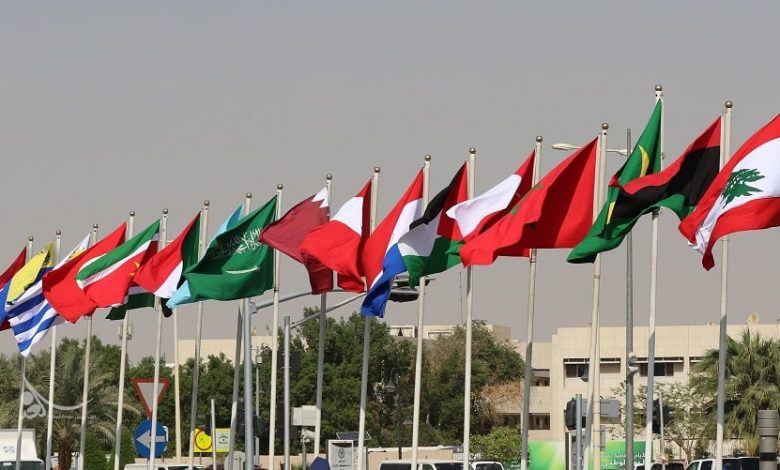Twenty-one Former Arab Ministers Support Iran Uprising and Iranian Resistance

Written by
Shamsi Saadati
Twenty-one former ministers of Arab countries issued a statement to condemn the Iranian regime’s brutal crackdown on protesters as well as to support the nationwide uprising that is calling for regime change in Iran.
Stressing the role of the MEK Resistance Units in leading the uprising, the Arab ministers emphasized that the people of Iran have a democratic alternative whose goals are illustrated in the 10-point program of the NCRI President-elect Mrs. Maryam Rajavi, and deserve global recognition and support.
The joint statement of the former ministers is as follows:
Supporting the Uprising of the Iranian People and Condemning the Brutal Suppression of Young People Involved in the Uprising
Since mid-September, protests and anti-regime uprisings have spread all over Iran. The protests by women and youth have so far expanded to more than 140 cities in all 31 provinces. Demonstrations are taking place in 16 major universities. The protesters, chanting the rallying cry of “Death to Khamenei,” seek to overthrow the unelected religious dictatorship. The repressive forces fire tear gas and live ammunition at the protesters.
The new round of uprisings was sparked when Mahsa Amini, a 22-year-old woman from Iran’s Kurdistan province, was arrested in Tehran under the pretext of mal-veiling and was murdered as a result of police beatings. As of September 25, at least 180 demonstrators have been killed and countless others have been injured, and over 8,000 arrested. By disrupting and disconnecting the Internet in large parts of Iran, the regime is trying to prevent the transmission and dissemination of news and images of protests, the true dimensions of the uprising, and finally revelations regarding the scope of its massacre and suppression. The international community must guarantee free access to the Internet for the people of Iran.
Resistance Units and the organized opposition are taking serious risks to play a vital role in organizing and sustaining these protests while putting up a resistance front against repression.
Over the last 40 years, executions and repression have been carried out by Iran’s current leaders, such as Ali Khamenei and the regime’s current President, Ebrahim Raisi. Amnesty International has repeatedly called for the prosecution of Raisi for his role in the massacre of political prisoners in 1988. In that year, 30,000 political prisoners, 90% of whom were from the Mujahedin-e Khalq (MEK/PMOI), were executed in accordance with Khomeini’s fatwa. During the uprising of the Iranian people in November 2019, more than 1500 demonstrators were killed by the Islamic Revolutionary Guard Corps (IRGC).
In view of the above facts, we, the undersigned, issue the following call to the United Nations, its member states, and other international organizations:
The prospect of change in Iran has never been this accessible. It is time to recognize the right of the Iranian people to defend themselves by any means necessary and to overthrow this regime.
Strongly condemn the killing of demonstrators in Iran and take urgent measures to stop this repression. The dossier of this regime’s crimes must be referred to the United Nations Security Council and those responsible for committing such crimes must be brought to justice.
The people of Iran have a democratic alternative whose goals are enshrined in the Ten-point Plan articulated by Mrs. Maryam Rajavi, the President-elect of the National Council of Resistance of Iran (NCRI). This alternative deserves all-embracing support.
Any dialogue or dealings with the Iranian regime or the continuation of relationships with it must be predicated on the release of all those arrested during the recent uprising.
Signatories
Saleh Al-Qallab, Former Jordanian Minister of Information
Atef Al-Battoush, Former Minister of Parliament Affairs in Jordan
Muhammad Al-Daoudia, Former Minister of Agriculture – Jordan
Dr. Bassam Al-Amoush, Former Minister of Administrative Development in Jordan
Dr. Faisal Al-Rufou`, Former Minister of Information in Jordan
Dr. Musa Al-Maani, Former Minister Counsellor in the Affairs of the Prime Ministry in Jordan
Major General Ashraf Rifi, Former Lebanese Minister of Justice
Elie Marouni, Former Minister of Tourism in Lebanon
Dr. Moeen Al-Merhebi, Former Minister of Refugee Affairs in Lebanon
Dr. Hoda Badran, Former Egyptian Minister of Women and President of the Arab Women’s Union
Tarek Mahdi Abdel Tawab, Former Minister of Information in Egypt
Dr. Ahmed Gamal El-Tohamy, Former Minister of Investment, President of the Human Rights Party and President of the Political Coalition and Citizenship in Egypt
Dr. Ahmed Attia, Former Yemeni Minister of Awqaf
Dr. Khaled Al-Yamani, Former Minister of Foreign Affairs of Yemen
Muhammad Askar, Former Minister of Human Rights in Yemen
Ahmed Al-Musaibili, Advisor to the Minister of Information in Yemen
Sakher Ahmed Al-Wajiyah, Former Minister of Finance of Yemen
Naima Farrah, Former Minister of Information in Morocco
Dr. Masouda Bint Baham, Former Minister of Rural Development in Mauritania and the First Deputy of the African Parliament – Mauritania
Hatem El-Sir Ali, former Sudanese Minister of Transport and Urban Development
Dr. Ayham al-Samarrai, Former Iraqi Minister of Electricity
Twenty-one Former Arab Ministers Support Iran Uprising and Iranian Resistance

